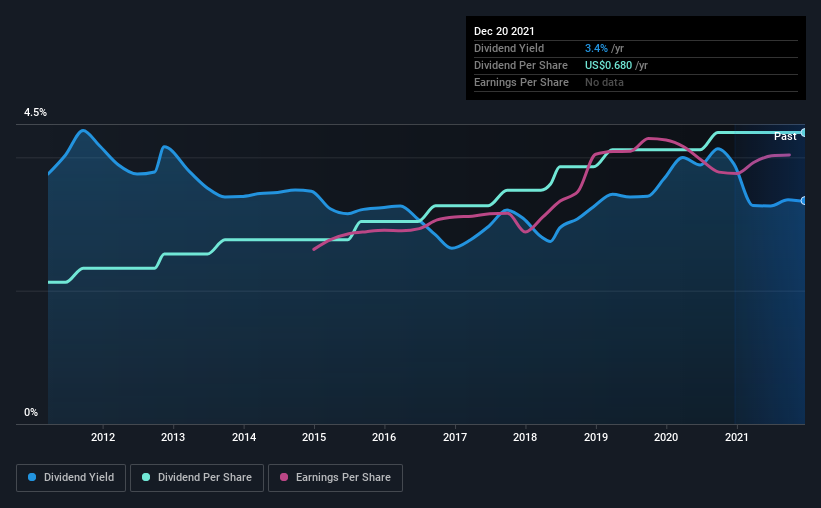- United States
- /
- Banks
- /
- OTCPK:BKSC
Bank of South Carolina (NASDAQ:BKSC) Is Due To Pay A Dividend Of US$0.17

The board of Bank of South Carolina Corporation (NASDAQ:BKSC) has announced that it will pay a dividend of US$0.17 per share on the 31st of January. The dividend yield will be 3.8% based on this payment which is still above the industry average.
View our latest analysis for Bank of South Carolina
Bank of South Carolina's Dividend Is Well Covered By Earnings
If the payments aren't sustainable, a high yield for a few years won't matter that much. Based on the last payment, Bank of South Carolina was quite comfortably earning enough to cover the dividend. This means that a large portion of its earnings are being retained to grow the business.
If the trend of the last few years continues, EPS will grow by 5.7% over the next 12 months. If the dividend continues on this path, the payout ratio could be 63% by next year, which we think can be pretty sustainable going forward.

Bank of South Carolina Has A Solid Track Record
The company has a sustained record of paying dividends with very little fluctuation. Since 2011, the first annual payment was US$0.33, compared to the most recent full-year payment of US$0.68. This works out to be a compound annual growth rate (CAGR) of approximately 7.5% a year over that time. Companies like this can be very valuable over the long term, if the decent rate of growth can be maintained.
Bank of South Carolina Could Grow Its Dividend
Investors who have held shares in the company for the past few years will be happy with the dividend income they have received. We are encouraged to see that Bank of South Carolina has grown earnings per share at 5.7% per year over the past five years. Since earnings per share is growing at an acceptable rate, and the payout policy is balanced, we think the company is positioning itself well to grow earnings and dividends in the future.
We Really Like Bank of South Carolina's Dividend
Overall, we like to see the dividend staying consistent, and we think Bank of South Carolina might even raise payments in the future. Distributions are quite easily covered by earnings, which are also being converted to cash flows. All in all, this checks a lot of the boxes we look for when choosing an income stock.
Market movements attest to how highly valued a consistent dividend policy is compared to one which is more unpredictable. Meanwhile, despite the importance of dividend payments, they are not the only factors our readers should know when assessing a company. Are management backing themselves to deliver performance? Check their shareholdings in Bank of South Carolina in our latest insider ownership analysis. We have also put together a list of global stocks with a solid dividend.
If you're looking to trade Bank of South Carolina, open an account with the lowest-cost platform trusted by professionals, Interactive Brokers.
With clients in over 200 countries and territories, and access to 160 markets, IBKR lets you trade stocks, options, futures, forex, bonds and funds from a single integrated account.
Enjoy no hidden fees, no account minimums, and FX conversion rates as low as 0.03%, far better than what most brokers offer.
Sponsored ContentValuation is complex, but we're here to simplify it.
Discover if Bank of South Carolina might be undervalued or overvalued with our detailed analysis, featuring fair value estimates, potential risks, dividends, insider trades, and its financial condition.
Access Free AnalysisHave feedback on this article? Concerned about the content? Get in touch with us directly. Alternatively, email editorial-team (at) simplywallst.com.
This article by Simply Wall St is general in nature. We provide commentary based on historical data and analyst forecasts only using an unbiased methodology and our articles are not intended to be financial advice. It does not constitute a recommendation to buy or sell any stock, and does not take account of your objectives, or your financial situation. We aim to bring you long-term focused analysis driven by fundamental data. Note that our analysis may not factor in the latest price-sensitive company announcements or qualitative material. Simply Wall St has no position in any stocks mentioned.
About OTCPK:BKSC
Bank of South Carolina
Operates as a bank holding company for The Bank of South Carolina that provides financial products and services primarily in Charleston, Berkeley, and Dorchester counties of South Carolina.
Flawless balance sheet established dividend payer.
Market Insights
Community Narratives



